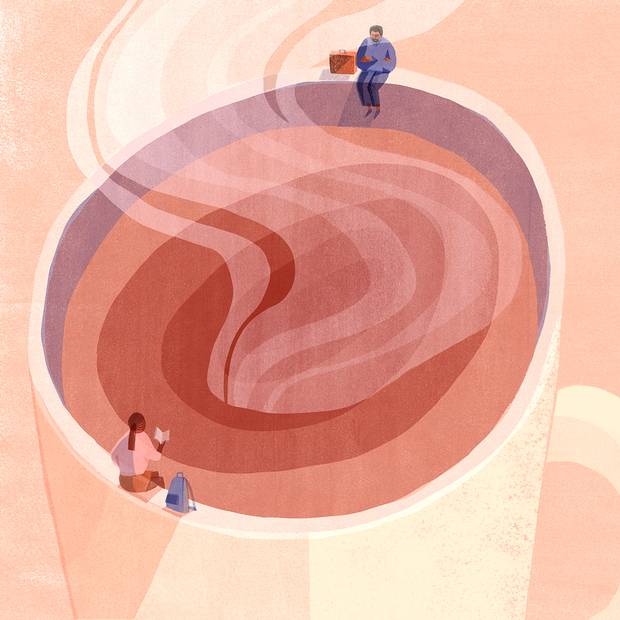Facts & Arguments is a daily personal piece submitted by readers. Have a story to tell? See our guidelines at tgam.ca/essayguide.
Let me set the scene for you.
Enter stage right: a twentysomething on the verge of graduating from postsecondary education. The setting: a social situation along the lines of a dinner party hosted by parents, a neighbourhood barbecue or an agonizingly long coffee line. Enter stage left: well-meaning adult, something along the lines of father's golfing buddy, or mother's volunteer committee member. Mood: light, both parties eager to keep conversation pleasant.
Well-meaning adult asks a question about postgraduation plans. The question may take on different forms, depending on how familiar they are with twentysomething's ambitions. If well-meaning adult is truly socially savvy, the question takes the form of something along the lines of: "So, what are you up to next year?" These socially savvy individuals are fewer and farther between than one might expect.
In my own experience (because I should probably stop pretending that twentysomething isn't just a stand-in for me), the exchange is much more likely to go like this:
Well-meaning adult: "Remind me, what your degree was in again?"
Me: "English literature."
Well-meaning adult: "Wow. What in the world/heck/hell are you going to do with that?"
This question is stress-inducing like no other. And not because I don't have a plan for my future. I do. Or at least as much of a plan as any engineering, nursing or business grad does.
The anxiety stems from the fact that my degree is constantly undervalued for not having a job title awarded at the end of it. The anxiety stems from the fact that incredible high-school English teachers have to deal with students who have been told that English isn't a subject that matters for their future career; these are often the same parents that spent hours reading their children Dr. Seuss books, encouraging them to race through the Magic Tree House series, telling them that they could dream as big as any character in any book.
The anxiety stems from the fact that to answer the question, you seem to have to be able to defend every literary text post-Bible and up to whatever the last book the well-meaning adult has read. There is always, always the danger of sounding pretentious, but also the horror at sounding as though one doesn't have any "facts" to offer.
I've given many different answers over the course of my life (it depends on my mood and how much longer I think I'm going to be stuck in the conversation). My cheekiest response? "Whatever in the world/heck/hell I want, because I learned how to think critically." I also learned how to communicate effectively and to write convincingly – I mean, what kind of job isn't looking for those sorts of skills?
Lately, I've tried to get more sincere in my answers because what these nice, well-meaning people are really asking is – why does literature matter? Why do we need people studying it? They're wondering this while subconsciously thinking back to how much they detested reading [insert least-favourite Shakespearean play] in grade [insert least-favourite high-school year].
Literature matters because why else would copies of 1984 and The Handmaid's Tale go flying off the shelves after the election of Donald Trump? Literature matters because our media, our history, our cultures, our religions, our lives are all narratives – they're stories we tell that are worthy of analysis rather than blind acceptance.
Literature matters because everyone has a quote that gives them strength or a story that makes them want to cry.
We're living in a world where fake news and alternative facts – concepts that are dangerously close to and much more malevolent than fiction – abound. And while fake news, alternative facts, whatever the current buzzword for lies is these days, pretends to be truth, fiction allows the truth through pretend.
Literature isn't just escapism; it's a safe place to explore reality. One of my favourite books, Flight Behavior by Barbara Kingsolver, tackles the issue of climate change by depicting a small town in Tennessee as inundated with Monarch butterflies who have been thrown off their normal migration patterns because of environmental degradation (something that is really happening). What really stayed with me from that book, though, was the statement that we need a "truth we can feel." Literature lets one step into another person's shoes (my high-school English teacher would be appalled that I used a cliché) and experience another person's truth, then consider how it intersects with one's own.
I think, somewhere along the way, as our interactions with narratives have increasingly become 140 characters long or 10 seconds in length and consumption of terror, violence, corruption and suspicion have become a part of our daily diet, it has become harder and harder to feel our truths and easier and easier to scroll by them. That just makes it more important to engage with them.
Let me set the scene for you again. Enter stage left: a twentysomething sits down in front of laptop in a café, opens a Word document, starts thinking about how she thinks about the world. Writes it down. Exits.
Enter stage right: Well-meaning adult enters the same café, sits down, opens newspaper and reads essay about how a twentysomething thinks about the world. He thinks about this, then thinks about how they think about the world.
Mood: Vibrant potential.
Caela Fenton lives in Mississauga.
